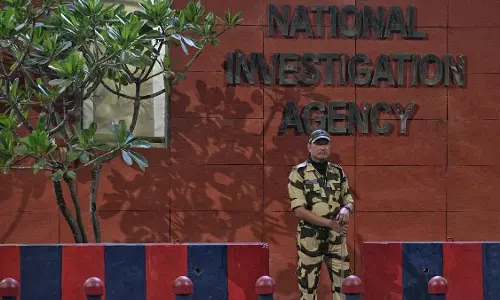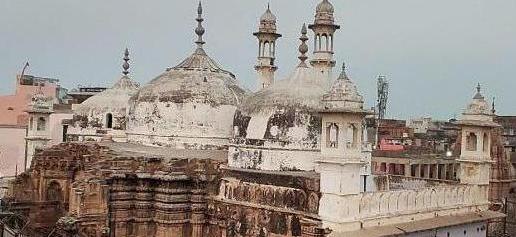
Gyanvapi mosque committee objects to survey of remaining cellars
text_fieldsVaranasi: The Archaeological Survey of India (ASI) survey of the remaining cellars of the Gyanvapi mosque has been opposed by the Anjuman Intezamia Masjid Committee (AIMC), which manages the mosque, claiming that it may do harm to the cellars.
The objections were raised on Tuesday during the hearing of a petition requesting an ASI survey of all other locked cellars in the Gyanvapi mosque complex using ground penetrating radar (GPR) and other modern techniques. The court set February 15 as the case's next hearing date.
Rakhi Singh is the main plaintiff in the Maa Shringar Gauri case, which led to the survey of the complex by the Archaeological Survey of India (ASI) last year. The remaining cellars, the subject of the latest petition were not accessed during the survey by ASI.
During the hearing on Tuesday, advocate Akhlaque Ahmad representing the AIMC, argued, “We have objection to the demand of survey because that would cause damage to the cellars". Ahmad said an objection against the plea would be filed in the court.
Advocate Saurabh Tiwari representing plaintiff Rakhi Singh argued, “The survey of the remaining cellars is required to ascertain the religious character of the Gyanvapi premises. During the recent survey by the ASI, the cellar numbers N1 and S1 could not be surveyed as their entrances are blocked with stones and bricks.”
Tiwari sought the removal of the debris blocking the entrances through a safe method.
“The plea has been filed seeking an order to the ASI to undertake the scientific investigation/survey of the cellars using GPR and other methods without causing damage to the existing structure,” Tiwari said.
The ASI conducted the survey in the Gyanvapi mosque complex for about 84 days, first for a few hours on July 24 and then from August 4 to the first week of November 2023 regularly on a court order. The agency submitted its survey report in the court of the district judge on December 18, 2023.
On January 24, the Varanasi district court ordered a copy of ASI’s report on the scientific survey of Gyanvapi mosque to be provided to the parties to the suit. Both Hindu and Muslim sides got a copy of the survey report on January 25.
Thereafter, quoting the ASI survey report, Vishnu Shakar Jain, a lawyer for the Hindu side, said a Hindu temple existed prior to the construction of the present structure (Gyanvapi mosque). Subsequently, the southern cellar of the Gyanvapi mosque was opened last week.
The development took place hours after the district court on January 31 allowed 'puja' in the southern cellar. The court directed the receiver to get the puja done by the plaintiff, Shailendra Kumar Pathak Vyas, who sought permission for it, and a priest nominated by the Kashi Vishwanath Temple Trust Board.
In his application, Vyas had claimed that his maternal grandfather used to perform prayers there till December 1993.
With inputs from IANS
























